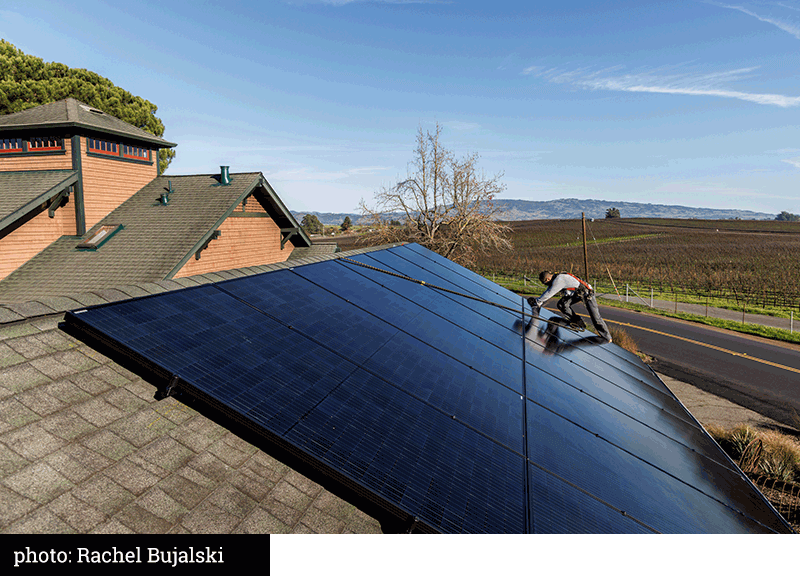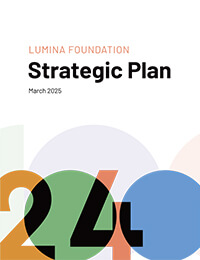In a changing world, education is more important than ever. It gives people the skills they need to secure good jobs, build stable careers, and contribute to strong communities. At Lumina Foundation, we believe that higher education should be a tool for opportunity, helping people create a better, more prosperous future for themselves and their families.
By 2040, 75 percent of adults in the U.S. labor force will have college degrees or other credentials of value leading to economic prosperity.
We’ve made great progress since setting our first goal in 2008—to have 60 percent of working-age adults with college degrees, certificates, or industry-recognized certifications by 2025. Today, that number has risen from 38 percent to 55 percent. But new challenges demand innovative solutions. The rising cost of college, doubts about job opportunities, and the increasing influence of artificial intelligence have led many people to question the value of earning college degrees. We aim to ensure education remains accessible, valuable, and aligned with today’s workforce needs.
Why This Goal Matters
People pursue education to find good jobs, support their families, and build meaningful lives. But many worry about the future. They are uncertain about the economy and how shifts like AI will affect their careers. Meanwhile, businesses and policymakers want to ensure they can develop talent, stay competitive, and adapt to change.
Higher education can provide solutions, but trust in colleges and universities has declined. To rebuild that trust, we must ensure that education delivers real value—helping people earn higher wages, secure stable jobs, and feel confident about their futures.
Read more: A bold vision for a prosperous future »
Lumina’s Strategic Plan
Strategies to accelerate and scale the redesign of systems to better serve today's students.
Learn MoreUnderstanding the 2040 Goal
What is the 2040 Goal?
By 2040, 75 percent of adults in the U.S. labor force will have college degrees or other credentials of value leading to economic prosperity.
How will Lumina define economic prosperity?
We will initially measure economic prosperity as people with college degrees, certificates, or industry certifications who earn at least 15 percent more than the national average for adults with only high school diplomas. We will develop better ways to measure economic prosperity over time.
Who will Lumina include in this measurement?
Working-age adults ages 25 to 64 in the United States who are part of the labor force—that is, individuals who are working, unemployed seeking work, or serving in the U.S. armed forces.
Read our FAQ to learn more.
To reach the 2040 goal, we’re concentrating on four priorities:

- Ensuring Credential Value: Education should lead to good jobs and financial security. Degrees and certifications must help people earn higher wages and build meaningful careers. We are working to ensure that education programs teach both job-specific skills and critical thinking, so graduates are prepared for the future.
- Expanding Access to Education: College should be within reach of everyone. But many students, especially those from low-income backgrounds, rural areas, and communities of color, face significant barriers. We are working to remove obstacles and make education more affordable and accessible.
- Helping Students Succeed: Enrolling in college is just the first step—students also need the support to finish. Financial struggles, family responsibilities, and mental health challenges make it difficult for many to complete their degrees. We are pushing for better student support systems, ensuring that more people graduate and find success.
- Redesigning Education Systems: Higher education needs to evolve. We must rethink how colleges operate, from improving affordability to updating financial aid programs. Our aim is to create an education system that meets the needs of today’s students and helps them build secure futures.
Why We Must Act
By 2031, 72 percent of U.S. jobs will require education or training beyond high school, according to estimates from Georgetown University’s Center on Education and the Workforce. If we don’t expand access to quality credentialing programs, millions of Americans will struggle to find good jobs, and businesses will face a worker shortage.
Education is also essential for reducing economic and racial disparities. Since 2010, higher education has contributed more than $14.2 trillion in lifetime earnings across the United States. To build a fairer, more prosperous society, we must ensure that everyone has access to the education they need to succeed.

Join Us in Creating Change
We can’t do this alone. Reaching our 2040 goal requires collaboration among educators, businesses, government agencies, nonprofits, and communities.
- Colleges and universities must focus on affordability and student success.
- Employers should invest in training and workforce development.
- Policymakers need to support education policies that prepare students for the future.
- Students and families should demand an education system that delivers real value.
Lumina leaders on our early investments
Lumina Foundation is committed to leading change. Through 2029, we will refine our long-term vision and launch new initiatives to break down barriers to education. We will invest in innovative programs, collaborate with national leaders, and push for policy improvements to help more Americans achieve their education and career goals.
The Road Ahead
Through 2029, we will refine a long-term vision for Goal 2040 and launch strategic initiatives that address immediate barriers and challenges. Here are examples of early investments:
- Making College More Affordable: The high cost of college limits access for many students, making economic security harder to achieve. Lumina aims to reduce affordability barriers by listening to students, evaluating policies, and promoting solutions. We want to lower costs, improve price transparency, and ensure policies focus on students’ real needs.
- Assessing Credential Value: Many states offer tuition help for short-term job training, but we know little about the results. Lumina will support up to 12 states in creating better plans for ensuring long-term prosperity.
- Measuring Economic Prosperity: We will develop ways to measure how different education and training levels benefit individuals after high school. Instead of only comparing wages to high school graduates, we want to track overall economic success in a broader way.



